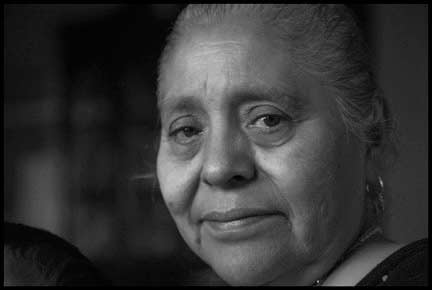
Did you know that Truthout is a nonprofit and independently funded by readers like you? If you value what we do, please support our work with a donation.
Lucrecia Camacho comes from Oaxaca, and speaks Mixtec, one of the indigenous languages and cultures of Mexico that was hundreds of years old before the arrival of the Spaniards. Today she lives in Oxnard, California. Because of her age and poor health, she no longer toils as a farmworker, but she spent much of her life in Oxnard’s strawberry fields, and before that, in the cotton fields of northern Mexico. She told her story to David Bacon.
I was born in a little town called San Francisco Higos, Oaxaca. I’ve worked all of my life. I started to work in Baja California when I was a little girl. I’ve worked in the fields all of my life, because I don’t know how to read or write. I never had an opportunity to go to school. I didn’t even know what my own name was until I needed my birth certificate for the immigration amnesty paperwork after I’d come to the US.
When I was seven, my mother, stepfather and I hitchhiked from Oaxaca to Mexicali, and I lived there for two years. I spent my childhood in Mexicali during the bracero years. I would see the braceros (Mexican guest workers) pass through on their way to Calexico, on the US side. I would beg in the streets of Calexico and they would throw me bread and canned beans on their way back home. I also begged in Tijuana. I’m not ashamed to share that because that is how I grew up.
I began working when I was nine years old. In Culiacan I picked cotton, and then I went to work in Ciudad Obregon, Hermosillo and Baja California. I would get three pesos a day. From that time on, I have spent my entire life working.
When I was thirteen my mother sold me to a young man, and I was with him for eight months. I soon was pregnant. After I started having children they were always with me. In Culiacan I would tie my young children to a stake in the dirt while I worked. I tried to work very fast, so that the foreman would give me an opportunity to nurse my child. After I came to the US, I did the same thing. I took them to the fields with me and built them a little shaded tent on the side of the field. Every time I completed a row, I would move them closer to me and watch them while I worked. I nursed them during lunch and they would fall asleep while I worked. It was always like that.
In Baja California we didn’t even have a home. But my mother also was always with me. It was like I was the man and she was the woman. I gave her all my wages. In Mexico my children struggled in school, because we never stayed in one place too long. I would take them out of school one or two months and then put them back in when we returned. It wasn’t until we arrived here in Oxnard that they went to school regularly. So not all of them were able to go to school. My oldest son never did.
I come from a Mixteco town in Oaxaca, but I didn’t know how to speak Mixteco when I was young. I learned it later. As a child I spoke Spanish. Two years after my father passed away I came to the US, in 1985. I’d borrowed a lot of money for my father’s burial and couldn’t pay it back. I didn’t want to come to the US because I didn’t want to leave my children, but my mother convinced me. I left the kids with her. I became a legal resident in the amnesty program. My employers in Arizona and Gilroy gave me the employment proof I needed, and my two youngest children and I were able to file our paperwork. They became legal residents first and I completed my paperwork in 1989.
I didn’t want to leave my mother alone, so I brought her in 1994. My mother died seven years ago, but she was always with me in good times and bad. I had children and she cared for them. She wanted to die in her hometown, so I had to grant her that last wish. I even have great grandchildren now.
I began working here in the fields in Oxnard when I first arrived in 1985, and worked until last year. I already had seven children by the time I got here. At first they stayed behind with my mother in our little town. Then I brought them in 1989 by paying a “coyote.” I have a sister who lives in Tijuana, and first I brought them from Oaxaca to her home. I’d go to Tijuana every week or two to take them money for food. From there I brought each of them across, one by one. In those times, it cost $1,600 for each one.
Now they charge $7,000, which is nearly impossible to pay because we don’t make that much money. It’s a sad situation. We want a better life, so we come here. We earn a living, but with a lot of hard work and sweat. It was very hard for me because I have ten children and have always been their mother and father.
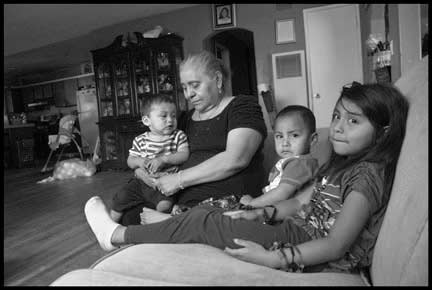 Lucrecia Camacho and three of her grandchildren Timoteo, Aron and Genesis. (Photo: David Bacon)
Lucrecia Camacho and three of her grandchildren Timoteo, Aron and Genesis. (Photo: David Bacon)I’ve always been alone, a single mother of ten children. When I got here I traveled with other illegal workers just like myself. I came here because people said money was literally for the taking, but it wasn’t true. It was hard to find work in 1985, and immigration authorities picked me up sometimes twice a week. But it was easier to cross the border back then. We were dropped off in San Ysidro, but we just crossed the border again, and were back at work in three days. It wasn’t very expensive either. It became more expensive to cross the border in 1987 and 1988.
I first began to work illegally, but I couldn’t get steady work. I earned $80 a week in those days. It was difficult to find a place to live. We lived in a small trailer that was rented by many of us, so we literally slept side by side. We would bathe outside, wherever we could find water.
From Oxnard I went to work in Arizona in 1986 because we heard work was bountiful. We struggled a lot, because we didn’t have food and lived out of our old car in the orchards where we were working. I earned $7 a day then, but was charged $3 for rent and 50 cents for drinks. We cut asparagus in bunches of 32 and placed them in boxes. If the boxes weren’t the required weight, they told us to do them again. They hardly paid us anything.
From there I went to work in the green onions. I had to go to work at 2 a.m., but we couldn’t begin to pick until the dew on the plants had dried, which often meant we didn’t start work until 11 a.m. But we still had to arrive at 2 a.m., or others would be hired in our place. If we arrived later, we wouldn’t get a job. So we’d get in line and build a fire to keep warm and wait for 11 a.m. I’d work from 11 until 1:30 p.m. and only earn $3 a day. What am I going to do with $3? Nothing. I sometimes earned $2.
I came back to work in Oxnard after that, in January of 1987, and I couldn’t find work. I went to Gilroy, where I was lucky to find a good boss, who rented us a small house. There we harvested bell peppers. He took good care of us, because immigration officials were everywhere. We began work at 5 a.m. and worked until 9 a.m., which is when they usually came around. We came back to work at two in the afternoon, once they were gone. We were able to work a lot, and didn’t go to bed hungry.
I’ve always worked the strawberry harvest here in Oxnard. I’d finish that in July and go to Gilroy to work the jalapeño peppers, bell peppers and cherry tomatoes, in July. I brought my oldest daughter and son with me, and the three of us worked there. They would get out of school in June and worked July and August with me to earn money for their school clothes. They went back to school the 15th of September, so they worked with me 40 days. I would bring them back to Oxnard to start school, which is why I couldn’t just leave my Oxnard apartment. I’d pay $775 rent for my children to stay in Oxnard, and then $600 for myself in Gilroy. I never had any money left after that, but I had to do it.
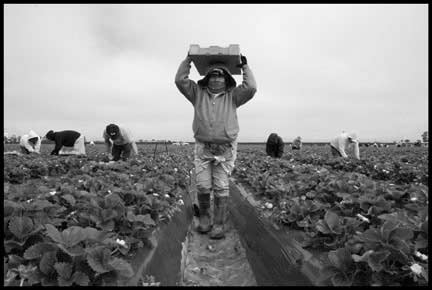 Hieronyma Hernandez. (Photo: David Bacon)
Hieronyma Hernandez. (Photo: David Bacon)I’d take my kids back to Oxnard for school, and return to Gilroy to work all of September and October. I lived in a large room that was divided into smaller rooms. It had a stove and outdoor bathroom. We were paid piece rate, not by the hour. They paid 80 cents for a bucket of jalapeños. Jalapeños with the stem were paid at $1.10 a bucket. I was able to fill 38 to 40 a day. I’d get back to Oxnard in the middle of November, rest a bit, and then start the strawberry harvest again about January 20th. I worked a long time in Gilroy, starting in 1985. It’s been six to eight years that I haven’ gone. I couldn’t find housing one year, and after that they wouldn’t hire me any more.
In the strawberries they also paid piece rate in April, May and June. The other months they paid by the hour. When I first started, it was $3 an hour, and the piece rate was 80 cents a box. The year before last I was paid $8.25 an hour. The regular box rate was $1.25, the little box was $1, and the two-pound box was $1.50. If I was able to fill 40 boxes, it was a good day. The younger, faster men can pick 70 or 80 boxes a day.
The strawberry harvest looks easy enough, but once you try it, it’s hard. I don’t wish that kind of work on my worst enemy. When you’re young, you work hard and get tired, but once you get home and take a shower you’re fine. Now that I’m old, I deal with arthritis and osteoporosis. My feet hurt and they swell. Many workers have been permanently injured. I have a nephew who hurt his back working in the strawberries, and a cousin who died of pneumonia because we work in the mud when it’s raining.
We ate bean, potato and egg tacos. No beef or chicken. We couldn’t afford to buy meat. At times we ate vegetables from the fields that had been sprayed with pesticides. We just washed them and ate them anyway. When I was working in the pepper harvest, I would make delicious salsas for my potato and egg tacos.
The fruit that brings the most money here is the strawberry crop, but they pay us a wage that barely allows us to make a living. Then they turn around and sell each box of strawberries for $18 or $20. If we pick 80 boxes, how much do you think they make from that? You’d think the owners would have enough money to pay workers higher wages, but they pay it to the foreman instead. The foreman has a brand new car every year and the worker doesn’t get anything. Every year I see foremen driving around in those brand new cars and I ask myself why.
The foremen now choose workers who can pick 100 to 130 boxes per day. I know one who only hires immigrants without papers because she says legal residents complain too much. They tell the ones without papers they’re going to call immigration officials or fire them if they complain. These workers try and stay on the foreman’s good side by bringing her homemade tortillas, mole and even Chinese food. I’m not going to bring her anything; I don’t get paid enough.
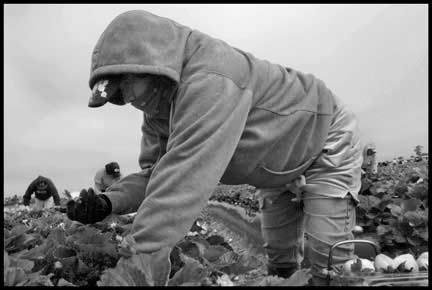 Hieronyma Hernandez, a Mixteca immigrant strawberry picker in Santa Maria. (Photo: David Bacon)
Hieronyma Hernandez, a Mixteca immigrant strawberry picker in Santa Maria. (Photo: David Bacon)If the foreman doesn’t like you, he makes you redo the work. In the strawberry fields you’re always worried that the foreman is going to send you back and tell you to redo your box because it’s not full enough. In the morning as soon as I get to the field, I pick four boxes so that I can have extras in case they tell me I have to redo some of the boxes during the day.
It’s always based on if they like you or not. We just have to put our heads down and work quietly. There were many times I stayed quiet and didn’t defend a fellow co-worker, but one time I did speak up. I had a woman foreman who spoke to us disrespectfully. When I asked her why, she told me to give her my tools and fired me. I told her I didn’t understand why I was being treated that way, but the other foreman grabbed me by the arm and told me to leave.
Our work and life is hard here, and we don’t see many benefits. When the cost of living was low, our wages were low. When our wages went up, it was only because of the increased cost of living. Have you seen the current gas prices? Before we had to work an hour to cover our cost of gas, and now we have to work two hours. We don’t have anything left. The more we earn, the more they take away. We can’t move forward.
If you want to get ahead here, you have to live in cramped quarters. Here, the rich even have rooms for their pets, but we have no room for ourselves. When we first moved here, there were about 20 people living in this house. Now that my kids have moved on, there are ten now. We needed to share the cost of rent as much as we could. We can pay more now because some of us get decent wages. My daughter gets $12 an hour. She speaks English, Spanish and other languages.
I tell my kids how much I’ve struggled. When I worked the strawberry harvest, if I didn’t work fast I was fired immediately. I’m old now, so the last four years I was told I worked too slowly. But it’s difficult to work in the rain and mud. At times you’re lucky and find a good foreman who gives you waterproof ponchos. Other places charge for them, $25 for ponchos and $25 for rain boots.
All my life I’ve worked in the fields, but the work is harder for me now. I felt so strong when I was younger. I could work 24 hours. When I was young picking cotton in Mexico, I could easily lift 50 kilos [120 pounds]. I don’t know if it’s old age or my diabetes, but I work a lot slower now. The machine in the strawberry fields goes very fast and it’s frustrating to get left behind. I can’t fill the amount of boxes I used to. I feel nauseous and get headaches.
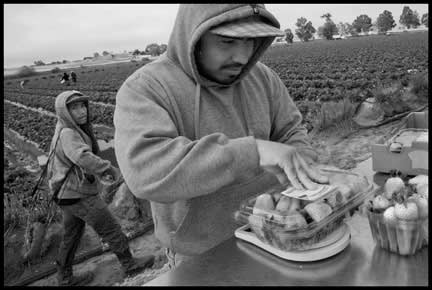 A checker weighs a basket of strawberries to see if he will credit the picker for the box. (Photo: David Bacon)
A checker weighs a basket of strawberries to see if he will credit the picker for the box. (Photo: David Bacon)They won’t give me a job anymore. If the foreman doesn’t like you, then you aren’t hired. They always choose the pretty women and family members first. As a woman working in the fields, if you didn’t have a good foreman, you were treated badly. You had to ask for permission to take a day off, but you were given a ticket. After accumulating three tickets, you were fired. I’ve also heard complaints of sexual harassment from women. Sometimes women don’t want to speak up. There are a lot who have lived through it, but are afraid to say something for fear that they’ll be reported to immigration officials.
In Culiacan, when I was young, I had a foreman who always sought out women to be alone with. He told me he liked me, but I told him I knew he had a wife and mistress. He told me that if I let him do what he wanted to me, I would still have a job. If not, I needed to look for another job. I told him he would not see me there the next morning. Some of us women don’t take that kind of abuse, but many do what they feel necessary to keep their jobs, even if it means being in the hands of the foreman. My daughter tells me of her factory job and how that still happens there. The women that let the foremen do what they want move up in position. Those that don’t stay in their same position.
As long as women accept this, there isn’t much that can be done. We need someone to help us and provide us with support. There are only a few of us in Lideres Campesinas. If I had a hidden camera, it would be so easy to show others what we face. Without that people don’t believe what we’re saying. When I worked in a plastics factory, a coworker had a doctor’s note saying she needed to work in a sitting position. The foreman fired her and then fired me for speaking up and defending her. I think a union would help, but it’s been difficult for one to get organized in the Oxnard area. When I began to wear my Lideres Campesinas tee shirt, I was told there wasn’t work for me anymore. I’ve been working here for many years and all of a sudden there wasn’t work for me. I’ve been looking for work ever since.
 Aron Martinez, Lucrecia Camacho’s grandson. (Photo: David Bacon)
Aron Martinez, Lucrecia Camacho’s grandson. (Photo: David Bacon)When I came here I didn’t expect a better life. I knew I would have to earn my living with physical labor. I was happy living in Mexico, but I didn’t have money even to clothe my children. Here I live better. I have the basics and I thank this country for giving me that. I hope to retire soon and go back to Mexico. I don’t plan on staying here. I’ll leave neither rich nor poor. The only thing I’ll take with me is aches and pains, because it’ s not like I have any money to take with me.
Copyright David Bacon.
A terrifying moment. We appeal for your support.
In the last weeks, we have witnessed an authoritarian assault on communities in Minnesota and across the nation.
The need for truthful, grassroots reporting is urgent at this cataclysmic historical moment. Yet, Trump-aligned billionaires and other allies have taken over many legacy media outlets — the culmination of a decades-long campaign to place control of the narrative into the hands of the political right.
We refuse to let Trump’s blatant propaganda machine go unchecked. Untethered to corporate ownership or advertisers, Truthout remains fearless in our reporting and our determination to use journalism as a tool for justice.
But we need your help just to fund our basic expenses. Over 80 percent of Truthout’s funding comes from small individual donations from our community of readers, and over a third of our total budget is supported by recurring monthly donors.
Truthout has launched a fundraiser to add 500 new monthly donors in the next 9 days. Whether you can make a small monthly donation or a larger one-time gift, Truthout only works with your support.